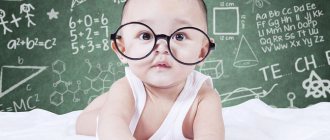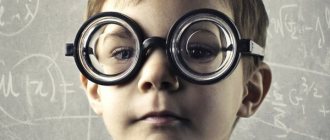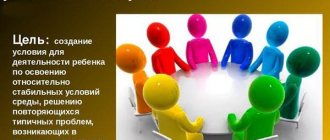- Methods of education. Imperative education suppresses initiative. In this case, the person becomes lethargic, weak-willed, and does not show independent interest. By encouraging initiative, it is possible to achieve the realization of the natural qualities of the individual.
- Possibility of free creative realization. That is, sufficient freedom of action, without control from parents and teachers (except for reasonable control to ensure the safety of the child and direct the creative spark in the right direction).
- Amount of free time. The more it is, the more effective the development. Provided that the resource is spent correctly.
- Environment. It influences in a significant way.
- Material component. Satisfying natural basic needs. With a sufficient degree of satisfaction of needs, an adequate environment for self-realization and development arises. Although, sometimes, need also becomes a catalyst for rapid development.
These are the main points. In fact, the speed and quality of development is influenced by even more factors: from health to motivation.
Who are geniuses and what is genius?
From time to time, a person with exceptional abilities appears on the world's horizon - a genius whose activities change the world, accelerate progress and bring society to a new stage of development. How to distinguish genius from giftedness and talent, which also help a person stand out from the mass of people? Is there some set of properties and distinctive features that determine whether a person is a genius, or whether he simply has well-developed intellectual abilities?
Talents often manifest themselves in several areas, but genius, as a rule, is narrowly focused and develops mainly in only one direction. In geniuses, a bias often works according to the principle: if there is a lot somewhere, it means there is little in something else, which is why geniuses are people unadapted to real life.
If we combine many definitions of genius, then in general it is clear that a genius, if he manifests himself, will be able to stand out from the crowd by creating something special and historically significant for society. The ancient Romans called genius (from the Latin genius - spirit) the highest degree of creative manifestations and abilities of an individual. Early Greek thinkers built on Hippocrates' idea of the "four humors" that determine human temperament. They believed that outstanding abilities were ensured by an excess of black bile (phlegm) in the body.
Phrenologists tried to find a genius by special bumps on the head, craniometers collected skulls - including the skull of the philosopher Immanuel Kant, which were then weighed, tested, measured in search of features in great people. And philosophers, at the suggestion of Immanuel Kant, adopted the following definition of genius - “the rare ability to independently understand concepts that, as a rule, are taught to a person by other people.”
Today, the term “genius,” although used in a broad sense, has not been fully studied by science, but scientists are actively trying to unravel the secret of genius. And the more they learn, the more new questions arise: is it possible to develop a genius in oneself, is genius inherited, is it determined by the special structure of the brain? Or the appearance of geniuses on the planet is like a flash in the sun, just a coincidence of circumstances and a gift sent down to a person from above.
People with EQ: why they are called to work
Am I a genius?
Based on various definitions of genius and research on the topic, here are 10 signs that you are a genius . They are ambiguous, and someone can argue with this, but if you find at least a third, then it’s time to talk about your genius nature.
- Knowledge of at least one foreign language. Especially if a person learned it spontaneously and easily. Although true geniuses usually speak several languages fluently.
- High IQ level (more than 150). You can check it online. Just don't be cunning.
- Preference for cats over dogs. Those who prefer calm pets are less sociable. Lovers of active dogs, on the contrary.
- You are the eldest child in the family. This is not due to genetics, but to the special attitude of parents towards their first-born.
- You are partial to alcohol. Nobody talks about alcoholism, but a glass of wine with dinner or a glass of cognac before bed is a good thing for you.
- You are left-handed. Left-handed people have higher cognitive abilities than right-handed people.
- Great sense of humor. This speaks of a special perception of the surrounding world and people.
- You often worry (about yourself, about loved ones, about distant things like abandoned children, etc.)
- You are lazy. Procrastination is common to many geniuses.
- You doubt your genius. Indeed, the brain of a genius usually denies this information so that it has something to strive for.
Now you know how to recognize a genius in yourself or another person. Of course, these are not specific or characteristic signs. Therefore, you should not go to extremes and, based on them, conclude that a genius is a lazy left-handed alcoholic who lives with cats and writes humorous scripts. But there is definitely something brilliant in such a person.
How to develop?
And again, based on signs of genius, someone may decide that they need to start drinking or get a cat. A genius is considered a person who is subconsciously attracted to all this. In this case, is it possible to become a genius, and how to do it? Psychology has the answer to this question too. Still, genius is not an innate gift, and it can be developed. Thomas Edison also wrote that “Genius is only 1% inspiration and 99% self-improvement.”
For the most purposeful and self-confident people, psychologists have identified 10 ways to become a genius .
- Regular physical activity. This improves blood circulation and brain function.
- Full sleep. During rest, the brain generates ideas even more intensely.
- Balanced diet. The brain needs certain vitamins and microelements, which are found in fish, meat, cheese, vegetables, fruits, dark chocolate, and nuts.
- Language learning. Excellent training of hidden brain resources. And getting to know a new culture helps you learn a lot of interesting things and communicate with foreign people.
- Playing a musical instrument. This stimulates fine motor skills, develops talent and mental flexibility.
- Creativity. This will help you become a genius through the development of extraordinary thinking.
- Neurobics. It's like aerobics, but you need to train your brain. Try to add something new to your usual routine. Write with your non-working hand, hide the TV remote control for a week, master touch typing, etc.
- Mental gymnastics. The Internet is full of logic puzzles and examples, by solving which you can develop logic, perception, observation, memory, attention and reaction speed, and learn something new.
- Solving complex problems. Don't be afraid to take on things that seem impossible to you at first. In any case, this will help to gain experience and develop desire.
- Regular brain activity. You cannot spend a single day in passive thoughts. The brain requires daily stimulation to maintain mental acuity.
Genetic psychopathology
If you look at the so-called genius elite, then approximately 80-85% of all its representatives will turn out to be mentally unstable people. And many of them had family problems. Let's take even the most famous people. At A.S. Pushkina had a hot-tempered mother. Criticism of Belinsky V.G. I was beaten by my parents as a child. Grandfather A.A. Blok ended his life in a mental hospital. D. Byron's father took his own life. And A. Schopenhauer became a philosopher largely thanks to his brilliant mother, who wrote about 25 literary works. The list can be continued for a very long time: in the biography of almost every gifted person there are similar stories.
In the 30s of the twentieth century, Doctor of Psychotechnical Sciences G.V. Segalin introduced the concept of “europathology,” which generalized the psychopathology and genetic predisposition of geniuses. The scientist studied for a long time how geniuses become. Segalin was sure that genius cannot be considered only from the point of view of mental abnormalities. In other words, not all geniuses are crazy, and not all crazy are geniuses. But to the question: are there any normal geniuses in the world, Segalin answers directly. Still, in his opinion, a brilliant person cannot have absolute mental health.
Does genius depend on brain size?
Scientists tried to find the answer to genius by comparing the brain volumes of ordinary people and geniuses. For example, the brain of Albert Einstein, which is kept in the Mütter Museum in Philadelphia. The brain of the great scientist was removed seven hours after his death, and in 1955 it was divided into 2000 parts and distributed among 18 research institutes located around the world to study and study such a valuable specimen. The museum houses only 46 parts, and entire queues of visitors line up to look at them under a magnifying glass and a microscope.
Scientists have conducted research and published scientific papers on the structural features of Einstein's brain to identify the relationship between brain neuroanatomy and genius. It turned out that Einstein’s brain weighed 1230 g, with the average value for an ordinary person being about 1400 g. The theory of the interdependence of brain volume and genius was smashed to smithereens by the scientist’s brain. In fact, if you look at the brain sizes of various animals, dolphins and whales are very smart - just like crows with their tiny brain sizes.
Scientific studies have shown that the areas of Einstein's brain responsible for speech and language are reduced, while the areas responsible for processing numerical and spatial information are enlarged. In 1984, Marian Diamond and her colleagues at the University of California, Berkeley were the first to publish a study of Albert Einstein's brain. The ratio of neuroglial cells in Einstein's brain was compared with the brains of 11 other men.
Neuroglial cells provide support and nutrition to the brain, form myelin and participate in signal transmission, and are another integral component of the brain in addition to neurons. This study showed that Einstein had more neuroglial cells than the average man. There is also a greater density of neural connections, and an unusual, very dense pattern of grooves in the parietal lobe. This probably provided the unique ability for abstract thinking with which Einstein formulated his theory of relativity.
Who are genius children?
Many parents praise their child for good grades, calling him “you are our little genius.” If they thought about what was said, they would take back their words. Brilliant children very often grow up into unlucky adults, with regular depression and a whole army of “cockroaches” in their heads.
Genius is a complex burden even for an adult, not to mention the psyche of a child. After all, such people, in addition to superhuman abilities, very often have a very vulnerable nature.
In childhood it is much more difficult to cope with “star fever”, and even more difficult to survive a sudden “fall”. Genius children are a great challenge for their families, since less brilliant parents may find it difficult to understand their child prodigies. And misunderstanding in the family leaves its mark for life. Although, there are happy stories that inspire.
Is genius accompanied by pathologies?
Scientists from the Icelandic company deCODE genetics conducted a study on the interdependence of creative abilities and mental disorders. The results were published in the prestigious scientific journal Nature Neuroscience. For the study, deCODE genetics used data from 130 thousand Europeans.
The summary of their work is that creativity is associated with genetic risk factors for schizophrenia and bipolar affective disorder. In other words, for people with the appropriate hereditary characteristics, there is a high probability that they will become musicians, artists, writers and scientists. It is assumed that creativity and bipolar disorder are somewhat correlated: during episodes of mania, a person suffering from this disease feels an incredible surge of energy and motivation - this is the period when he is most productive.
The most famous schizophrenic genius is Vincent Van Gogh. Thanks to his nervous illness, very contrasting paintings appeared in an expressive, impetuous manner, with ragged strokes. Edgar Poe, who wrote his stories under the influence of illness, said: “The world has always been filled with crazy people. People with mental illness or just eccentric crazy people changed the world. Bouts of rage or depression, or simply a different way of thinking, gave rise to mathematical theories, amazing inventions, amazing poetry, as well as musical and artistic creations.”
There is a hypothesis suggesting that among the geniuses of different eras there were autists. This assumption was made on the basis of the biographies of some famous personalities who, from childhood, were withdrawn and deeply focused on their inner world: Michelangelo, Hans Christian Andersen, Nicola Testa, Thomas Jefferson. However, Joan Freeman, a professor of psychology from London, founder of the European Council on High Ability, believes that the percentage of geniuses among autistic people and ordinary people is approximately the same. In general, highly gifted individuals on the planet are about one percent of the total population, that is, about 70 million.
Scientist Ruth Karpinski and her colleagues from Pitzer College (Claremont, USA) conducted an online survey among members of a non-profit organization for people with high IQs, Mensa, who were asked questions about their psychological and physiological health. To join the Mensa community of intellectuals, you must score 140 points or more during an IQ test (the IQ of the vast majority of people is 100). A survey of members of this organization showed that they are more likely than ordinary people to suffer from a number of serious disorders.
Trying to explain the results of the study, Ruth Karpinski and her colleagues developed a theory of the relationship between the superbrain and the hypersensitive body - those with high intelligence are prone to increased psychological and physiological excitability. Increased psychological excitability manifests itself in a tendency to ruminate and worry, while increased physiological excitability is the body's response to stress.
According to the superbrain theory, emotionally unstable people who are unable to ignore the flow of the smallest stimuli from the external environment are more susceptible to psychosis and react more violently to external circumstances. The results of this study should be interpreted with caution—showing that the disorder occurs more often in people with high IQs than in most people does not prove that high IQ causes the disorder.
Our abilities and our gifts
Each of us receives abilities at birth. In other words, these are our individual characteristics that help us successfully engage in certain activities. For example, the ability to sing, mathematics, painting, literature. In the future, each of us has a choice to develop our abilities or not.
We tend to set goals to achieve a pattern of success that is accepted and supported by society. As a result, our innate abilities often remain undiscovered. This brings a feeling of dissatisfaction into our lives.
Obsession or genius?
Giftedness is a set of abilities that can be considered as a person’s development potential. Giftedness in itself does not ensure success in a certain area of activity. It provides the opportunity for such achievement. This requires a certain amount of knowledge, skills and abilities.
Giftedness may imply the potential for development in a specific direction, that is, it may be special, or it may involve development in several types of activities, and this is already general giftedness.
How to calculate a genius and is a high level of intelligence equal to genius?
There is no particular need to calculate geniuses - Mozart was already composing musical works at the age of four, and it was clear that this child was born a genius. Intelligence is often considered the measure of genius—a measurable quality that leads to incredible achievement. On the other hand, identifying abilities and talents helps to direct a person’s learning in the right direction in a timely manner. Currently existing tests cannot fully reflect the full potential of a particular person. According to the results of an IQ test, a person with high intelligence is not necessarily a genius.
The first IQ test was invented in 1912 by the German psychologist William Stern: a set of well-known problems and puzzles was supposed to determine the developmental potential of children. However, the tests that followed to measure mental abilities, including the questionnaire of the British psychologist Hans Eysenck, who made the very idea of assessing intelligence popular, were intended rather for adults.
Today, most IQ tests measure a person's ability to analyze visual-spatial information, short-term memory and processing speed. In this case, the age of the subject must be taken into account. The questionnaires are compiled in such a way that the average value is equal to 100 points. A score below 70 is considered to indicate mental retardation, and people who score above 115 are especially intelligent. One can speak of outstanding abilities and even genius with an IQ above 140 points.
Lewis Terman, a Stanford University psychologist who helped develop the IQ test, observed more than 1,500 California schoolchildren with IQs above 140 in the 1920s. Years later, he concluded that monumental intelligence alone does not guarantee genius achievement. Some study participants were unable to achieve success; some were even kicked out of college. At the same time, Luis Alvarez and William Shockle, Nobel laureates in physics, did not have a high IQ, but became famous.
Testing does not prove a person’s real intelligence, because, firstly, you can train yourself to solve a certain type of problem, and secondly, the assessments of the same person may depend on his physical and psychological state. By the way, the American William James Sidis had a record IQ - his tests showed from 250 to 300. He was an expert in 40 languages and entered Harvard at the age of 11. And at the same time he did not make any contribution to science, having worked all his life as an ordinary office clerk.
A genius not only has a brilliant intellect, he knows how to use his talents in a way that others cannot: he is able to influence the world; behind genius there is always something more than generalizations and templates.
What factors influence the speed of implementation?
As was said earlier, genius can not only be realized faster, but also ruined. In the second, human society has achieved particular success. The social environment is the catalyst or inhibitor that determines the realization of natural talents. What factors have a significant impact?
- Methods of education. Imperative education suppresses initiative. In this case, the person becomes lethargic, weak-willed, and does not show independent interest. By encouraging initiative, it is possible to achieve the realization of the natural qualities of the individual.
- Possibility of free creative realization. That is, sufficient freedom of action, without control from parents and teachers (except for reasonable control to ensure the safety of the child and direct the creative spark in the right direction).
- Amount of free time. The more it is, the more effective the development. Provided that the resource is spent correctly.
- Environment. It influences in a significant way.
- Material component. Satisfying natural basic needs. With a sufficient degree of satisfaction of needs, an adequate environment for self-realization and development arises. Although, sometimes, need also becomes a catalyst for rapid development.
These are the main points. In fact, the speed and quality of development is influenced by even more factors: from health to motivation.
Genius gene
Advances in the study of genetics have made it possible to study human traits at the molecular level. Over the past few decades, scientists have tried to find genes associated with intelligence to prove that they play an important role in our intelligence and talents. In 2014, all the tabloids reported that scientists had found a gene for genius.
A study led by Dr Silvane Desrivieres from King's College London found that teenagers who scored high on intelligence tests had a high functioning NPTN gene. This is the gene responsible for encoding the neuroplastin protein, which is involved in intercellular interactions.
In addition to the standard medical examination, the participants' mental functions were assessed, including an IQ test to determine nonverbal intelligence, as well as tasks testing vocabulary and a matching test. In addition, using magnetic resonance imaging, data were obtained on structural differences in the brain of adolescents (differences in the thickness of gray matter were recorded in 33 different areas of the cerebral cortex).
Dr. Silvane Desrivieres emphasized that she and her group did not discover the intelligence gene at all, since the strength of the influence of this gene on mental abilities is small and does not exceed the influence of many other factors. The scientist believes that it is incorrect to say that a single gene determines a large complex of psychological characteristics. "We wanted to find out how structural differences in the brain relate to differences in intellectual ability."
Today, world science is conducting research to identify genes that are responsible for various biological and behavioral programs in the human body. However, there is no single gene of genius that contributes to the emergence of new Beethovens and Einsteins. Scientists from the Institute of Psychology at King's College London have found that a person's intellectual level and educational abilities are determined by the combination and work of almost two hundred genes.
Since each of the huge number of genes that form the “genius cocktail” is irreplaceable, not only their presence is very important, but also the way they are combined. However, genius is not a closed whole - the transfer of individual properties from parents to children does not at all guarantee inheritance and the method of their combination. That is why the likelihood that the children of a brilliant scientist will also be brilliant in science is quite small.
Favorable conditions can contribute to the best use of innate abilities. Heredity creates the possibility of genius, but the social environment increases the likelihood that a new genius will shine on the horizon. The birth of an intellectual “supernova” is influenced by many factors, time and place: the cultural level of the era, its demands, the opportunity to gain new knowledge, train and test one’s abilities.
Secrets of wild tribes - how people live without civilization
Rule ONE: Break the rules
Creativity is not limited schemes, but generalized models and systems that have guided artists over the centuries as they create their masterpieces and scientists as they make their discoveries. To go beyond the limits, you need to become thoroughly familiar with them (the limits).
Having learned what and how it should be, test all the rules, trying to follow and break them. Evaluate the experience gained and rewrite these rules in the form in which you see them now.
You will be surprised to discover that there are rules for creativity - and these are your personal rules. And other people don’t have to do the same as you. But for you, these rules will be perfectly balanced and will suit all parameters.
Is it possible to develop genius?
According to American psychologist Robert Strenberg, it is worth taking a broader approach to measuring intelligence levels. He included in the rating scale: creative intelligence - the ability to generate new ideas, analytical intelligence - the ability to compare, evaluate facts and draw conclusions, practical intelligence - is responsible for ensuring that a person can successfully socialize. And although critics call Strenberg's theory imperfect, it is believed that it is more capable of capturing the concept of “genius” than conventional IQ tests. Despite the fact that different geniuses are strong in different areas, they are all united by high creative abilities. This is probably one of the signs that distinguishes a genius from just a highly developed intellectual.
A good way to develop genius is through intensive improvement in your field, constantly leaving your comfort zone and communicating with other talented colleagues in the industry. The techniques are simple but very effective.
British scientist Hans Eysenck conducted many studies and was able to prove that creativity is associated with biological changes in only 15% of cases. This means, first of all, that the famous phrase “Geniuses are not born, they are made into geniuses” is true. And if not a genius, then anyone can potentially become creative.
For example, neurosurgeon John Adler devoted 12 years of his life to developing a radiotherapy system capable of removing tumors not only in the brain, but also in other parts of the body. In the 1980s, the medical community laughed at him and did not believe in the success of the venture. In 1992, Adler, together with the Schonberg brothers, developed the Cyberknife, thereby changing the approach to neurosurgery and giving the world a new tool that can be used to treat diseases. Did Adler change the world? Without a doubt. But it took him 12 years to do this. Moving towards a goal for so long is not an easy task.
The author of the book inGenius, Tina Seelig, has devoted several years to studying genius. In her opinion, all brilliant people have developed two skills: the ability to combine unrelated ideas and the ability to go beyond the boundaries of habitual thoughts. At the same time, by developing and improving skills, working hard and overcoming obstacles that 90% of people cannot overcome, you can become special.
Rule TWO: Go to the goal not through the intellect, but through feeling.
Once you see your goal, don’t rush straight to it. Learn the art of stopping and develop the ability to listen to yourself.
Your higher “I”, which knows much more than your intellect has managed to accumulate, will tell you, guide you, and give you signs. Dissatisfaction, fear, sucking in the pit of the stomach - these are the very signs. This is how mental attitudes manifest themselves in the body.
Use your intuition. Don't think, but feel. The ability to feel opens a direct path to the perception of the invisible, helps to bypass minor fears, standard solution methods, and the traps of thinking stereotypes that prevent you from producing an impeccable result.
Imagine that you are a psychoanalyst, and your problem came to you as a patient. Listen to her with all your attention. Feel why she came. Don't solve the problem, but let your feeling lead you to the right path.
Rule THREE: Develop your undeveloped skills
There are two ways to develop skills. The first is to develop the strong and not deal with the weak. The second is to develop your weaknesses.
Alas, neither the first nor the second path will reveal your genius, which includes three components:
- Originality
, or the skill of bringing the quality of an idea to the point where it acquires the ability to translate thoughts into practice; - Craftsmanship
, or the ability to wield the necessary tools; - Efficiency,
or the ability to get things done.
If you are like the majority of creative people, then most likely your skills are strong in only two of these areas. Then, to elevate your talent to the level of genius, work on developing a weak area of skills. For example, if you already excel at skill and originality, then set a goal to develop speed. If you are efficient and skilled, develop originality. By strengthening the weak links of your genius, you allow it to develop.
Take on projects and set yourself tasks that will be outside your comfort zone. There is no need to look for workarounds to overcome fears. Any genius will advise you to look your fear straight in the eye - this is the only way you can get rid of it. Remember that a person is not just a large accumulation of molecules, but also a spiritual being, each of us has his own special talent and ability to see.
By combining your passion with time-tested principles, you can begin the eternal cycle of creativity. This is the very ordinary magic that reveals genius.










